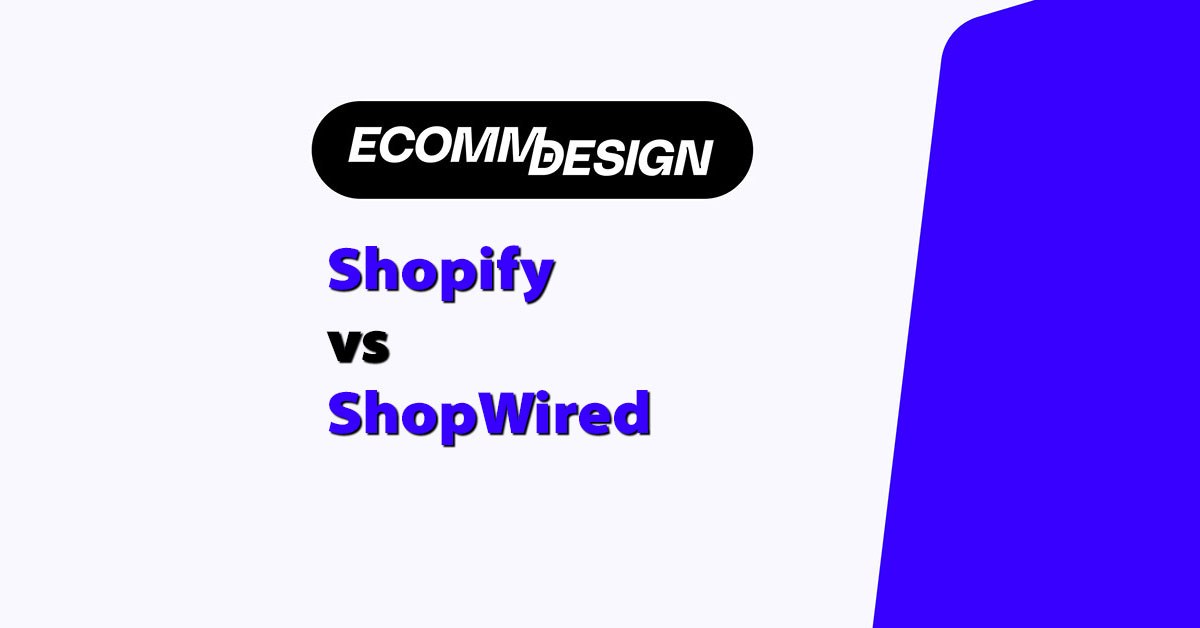
Shopify and Shopwired are two major ecommerce website builders, but which one is better for your store?
We’ve spent 100+ hours comparing the two based on features, pricing, templates, SEO, ease of use, and support — to give you a real-world recommendation that’ll save you time, money, and headaches.
TL;DR: If you’re a UK-based business looking for built-in features without stacking third-party apps, Shopwired is a smart, cost-effective choice.
But if you’re scaling internationally or want design flexibility, Shopify is more versatile overall.
Shopify vs Shopwired: Quick Verdict
- Shopify – Best overall for design flexibility and international scale
- Shopwired – Best for UK businesses needing built-in features and SEO
Quick Comparison: Shopify vs Shopwired
| Feature | Shopify | Shopwired |
|---|---|---|
| Best For | Global ecommerce businesses | UK-based small and mid-sized stores |
| Pricing | $39–$399/month | $39–$112/month |
| Free Trial | 3 days + $1/month for 3 months | 14-day free trial |
| Themes | 100+ themes (13 free) | 20+ themes (all free) |
| Apps | 8,000+ third-party apps | Limited third-party, built-in tools |
| SEO Features | Requires apps for advanced SEO | Advanced SEO built-in |
| Support | 24/7 chat | UK-based phone + email support |
Best for Pricing: Shopwired
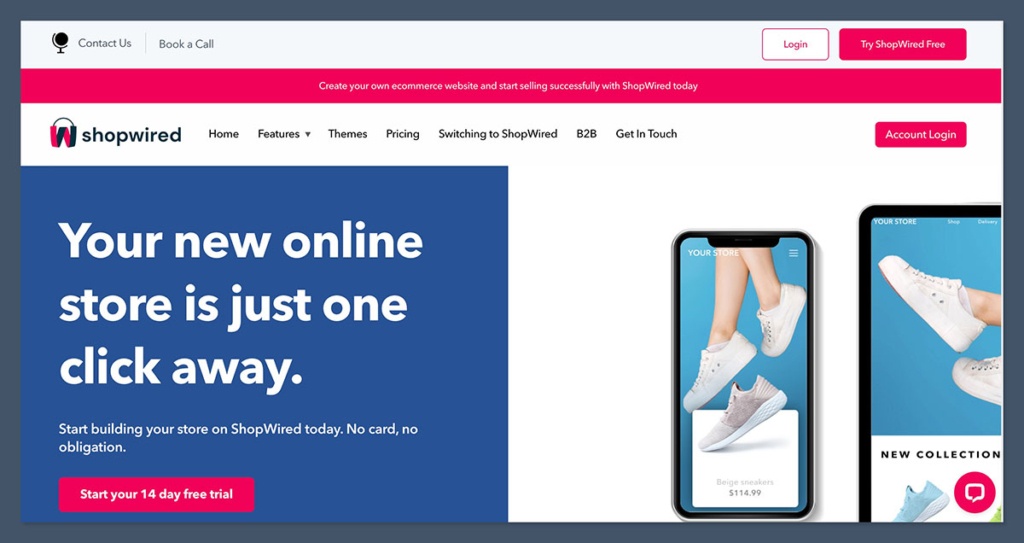
Shopify Pricing (USD)
| Plan | Monthly Cost | Key Features |
|---|---|---|
| Basic | $39 | Basic reports, standard checkout |
| Grow | $105 | Lower card fees, standard reports |
| Advanced | $399 | Advanced reports, custom pricing |
| Shopify Plus | $2,300+ | Enterprise-grade features, wholesale |
You also get a 3-day free trial, and for a limited time, the first 3 months cost just $1/month.
However, Shopify’s total cost increases quickly once you add premium apps, themes, and transaction fees. On the Basic plan, you pay 2.9 percent plus $0.30 per transaction using Shopify Payments.
For many businesses, Shopify’s true monthly cost ends up far higher than the plan price.
Add in a $300 theme, a couple of $20/month apps, and you’ll be easily spending $100 to $200 monthly before even calculating ad spend or payment fees. It’s powerful, but not cheap.
Shopwired Pricing (USD)
| Plan | Monthly Cost | Key Features |
|---|---|---|
| Pro | $39 | Full feature access |
| Advanced | $75 | Higher order volume support |
| Premium | $112 | Unlimited everything, priority UK support |
All Shopwired plans include built-in features like:
- Product bundles
- Subscriptions
- SEO tools
- Schema markup
- Custom fields
- Royal Mail integrations
There’s no app stacking required, so you won’t need to spend extra to unlock essential ecommerce functions.
Another major cost benefit with Shopwired is that all plans include VAT and EU tax setup, as well as multi-channel integrations, without needing to purchase add-ons.
For UK stores, this drastically reduces the monthly tech bill while keeping the site fully compliant and conversion-ready.
The Winner: Shopwired
Shopwired offers better value for UK sellers, with fewer add-on costs and more included functionality. Shopify gets expensive fast as your store grows.
Best for Selling Online: Shopify

When it comes to core ecommerce features, both Shopify and Shopwired cover the basics well — but Shopify gives you more flexibility, especially with large or complex product catalogs.
Sales Tools Breakdown
| Feature | Shopify | Shopwired |
|---|---|---|
| Product Variants | Up to 100 variants | Up to 250 variants |
| Bundles | Via paid app | Built-in |
| Subscriptions | App (e.g. Recharge) | Built-in |
| Multi-Currency | Yes | Yes |
| Real-Time Shipping | Yes | Yes (Royal Mail & DPD included) |
| POS Support | Shopify POS | Third-party integrations |
Shopify also includes Shopify Magic, a built-in AI tool for writing product descriptions and streamlining store setup.
You can also sell across Amazon, eBay, Instagram, TikTok, and more using the Shopify Marketplace Connect app.
The flexibility of Shopify really stands out when you’re dealing with large catalogs or international inventory.
It can handle hundreds of SKUs, custom pricing per region, and complex order routing across multiple warehouses — though many of these functions do require additional apps or Shopify Plus.
The Winner: Shopify
Shopify wins when it comes to scalability and multichannel selling. It’s ideal for merchants managing large catalogs or using multiple sales channels.
Best for SEO: Shopwired
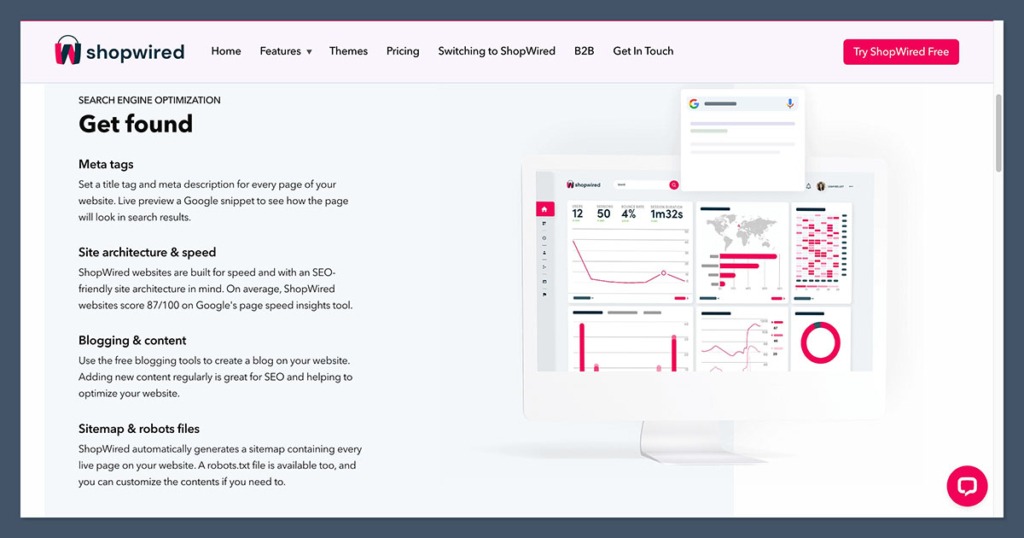
Search engine optimization is critical for ecommerce — especially if you want long-term organic traffic. Shopify and Shopwired both offer basic SEO features, but Shopwired takes the lead when it comes to built-in optimization.
SEO Feature Comparison
| SEO Feature | Shopify | Shopwired |
|---|---|---|
| Custom URLs | Limited structure | Fully customizable |
| Schema Markup | App required | Built-in |
| Image Alt Text | Yes | Yes |
| Redirects | Via app or manually | Included |
| Blogging | Basic | More structured layout |
| SEO Apps | 8,000+ in app store | Fewer apps, but more built-in |
Shopify offers SEO flexibility through apps like Yoast or Plug in SEO, but that means paying extra and dealing with integration complexity.
Shopwired, on the other hand, provides a cleaner SEO setup right out of the box, including proper canonical tags and structured data.
Where Shopify often falls short is in forced URL structures, such as /collections/ or /products/ being locked into the path.
Shopwired gives you full control over slug formatting, which helps with cleaner site architecture, keyword targeting, and improved CTR in the search results.
The Winner: Shopwired
Shopwired is the better choice for out-of-the-box SEO performance — especially for UK businesses focused on organic growth.
Best for Templates and Design: Shopify
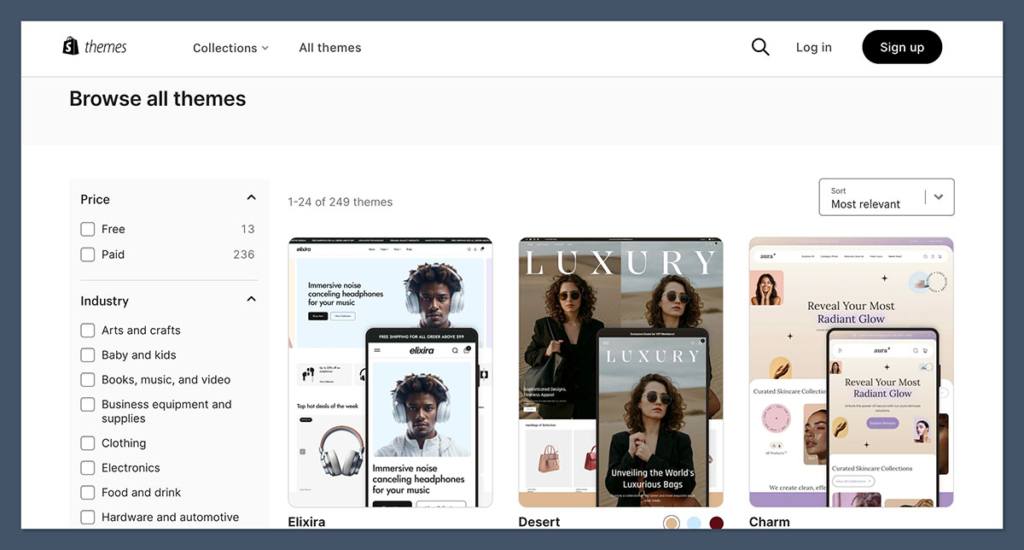
A modern, professional storefront is key to conversion. Shopify offers more design options and theme variety, though Shopwired templates are built with performance in mind.
Design Comparison
| Design Feature | Shopify | Shopwired |
|---|---|---|
| Free Themes | 13 | 20+ |
| Paid Themes | $180–$350 | All included in plans |
| Drag-and-Drop Editor | Section-based editor | Module-based editor |
| Theme Customization | Extensive (with Liquid) | Basic with CSS/HTML access |
Shopify themes are sleek, modern, and cater to a wide range of industries.
If you want full design control, Shopify’s Liquid coding system and theme flexibility are a huge plus — though it may require a developer if you’re not code-savvy.
Another bonus with Shopify is the integration with page builders like Shogun, PageFly, or GemPages.
These tools unlock more visual flexibility, which can be great for landing pages, product pages, and A/B testing — something Shopwired currently doesn’t support without custom code.
The Winner: Shopify
Shopify is the clear winner for theme diversity, design flexibility, and advanced customization.
Best for App Integrations: Shopify
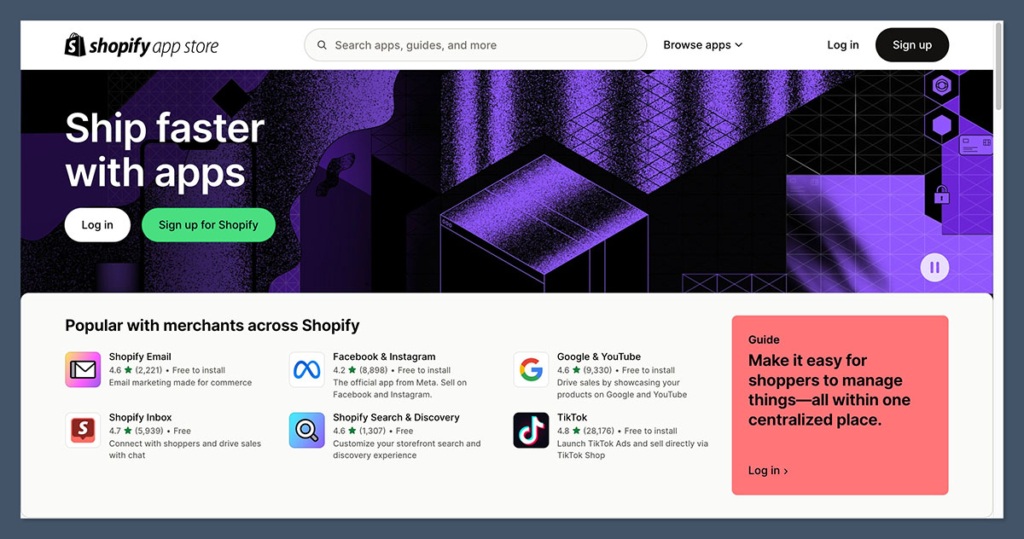
This one’s straightforward. Shopify dominates with its massive third-party app store.
App Ecosystem Comparison
| Feature | Shopify | Shopwired |
|---|---|---|
| Number of Apps | 8,000+ | Dozens |
| Categories | Marketing, SEO, POS | Limited |
| Custom Apps | Supported | Supported |
| API Access | Yes | Yes |
You can integrate Shopify with nearly any platform, from Klaviyo to Mailchimp, Recharge, Meta, Google Shopping, and more. But this can come at a cost — many must-have apps are $10 to $100 per month.
With Shopwired, the smaller app ecosystem means fewer options for customizing advanced marketing workflows or automations.
That said, the built-in core functions do reduce dependency on third-party tools, which makes maintenance and performance more predictable over time.
The Winner: Shopify
Shopify has more apps and integrations, making it ideal for scaling or customizing your store’s experience.
Best for Customer Support: Shopwired
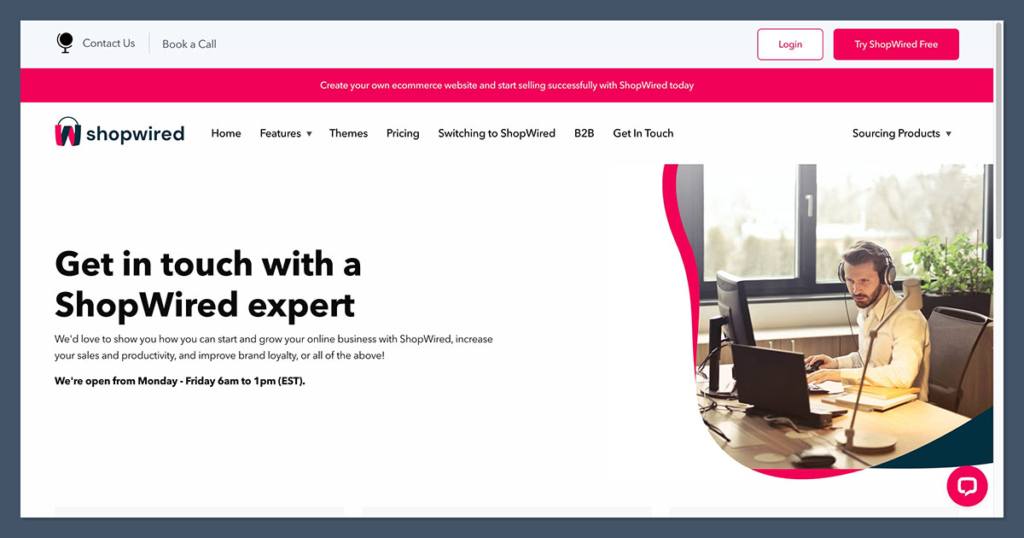
While both platforms offer robust support, Shopwired offers a more personalized, hands-on approach — especially for new sellers in the UK.
Support Comparison
| Support Option | Shopify | Shopwired |
|---|---|---|
| Live Chat | 24/7 | UK Business Hours |
| Phone Support | Shopify Plus only | Yes (All plans) |
| Email Support | No longer available | Yes |
| Setup Help | Limited without apps | Included with onboarding |
| Theme Support | Community/forum | Minor theme edits included |
Shopify support is reliable, but it’s more ticket-based and automated.
Shopwired’s team will help you configure VAT, shipping rules, and even assist with small design tweaks — no upsell required.
One standout with Shopwired is that you can actually speak to the same person more than once.
Unlike Shopify’s rotating support system, Shopwired often assigns a specific account manager or senior support staff for onboarding, which makes troubleshooting and store setup more consistent.
The Winner: Shopwired
Shopwired takes this one. For UK merchants, their local team and hands-on support really make a difference.
Final Verdict: Shopify vs Shopwired
So, which platform is right for you?
Choose Shopify if:
- You’re planning to sell internationally
- You want to customize your design extensively
- You need access to a wide app ecosystem
- You’re comfortable investing more as you grow
Choose Shopwired if:
- You’re based in the UK or Europe
- You want built-in features and better SEO by default
- You prefer less tech hassle and a clean setup
- You value responsive, human support
Our Recommendation
If you’re just getting started or running a UK-based ecommerce business, Shopwired offers a faster path to launch with fewer hidden costs.
Everything you need to go live — from product bundles to SEO tools — is already included, which makes it easier to focus on your products and marketing instead of figuring out which apps to install.
But if you’re scaling fast, managing a complex product range, or need full control over every detail, Shopify remains the most flexible solution out there.
It’s ideal for growing brands who want to expand into global markets, experiment with new tools, and customize their store design from top to bottom.
Both platforms offer free trials — so we highly recommend testing both before committing. That firsthand experience will give you a much clearer idea of which one fits your business model, your budget, and your goals.



